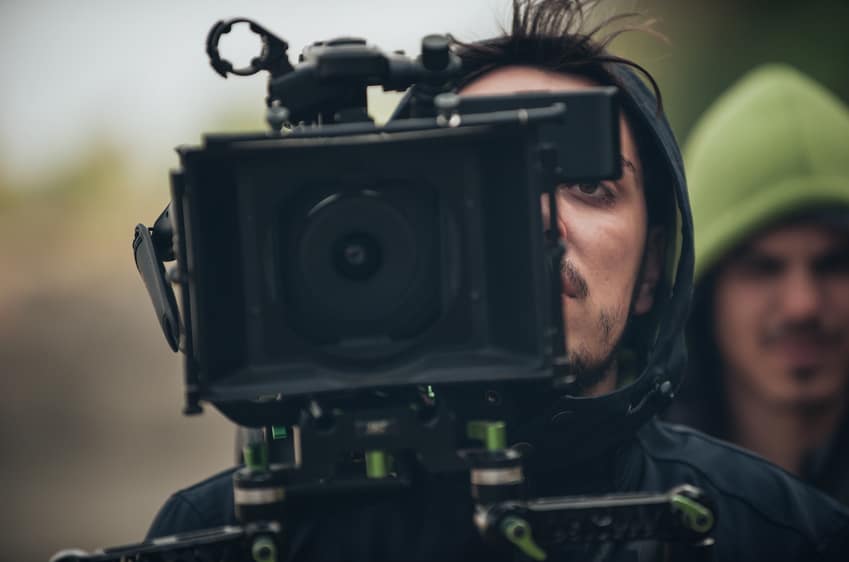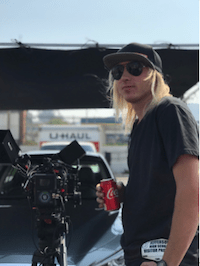Film Career Finder
Start Here:
1st AC (First AC)

How To Become a 1st AC (First AC)
- Career Description
- Salary
- Career Outlook
- Career Path
- Experience & Skills
- Education & Training
- Additional Resources
- Sources
- References
Career Description
“The responsibility of the First AC is to pull focus,” says Derek Plough, an experienced First AC who has worked on feature films, music videos, and commercials. If they are the Key 1st Assistant Camera, it’s also their responsibility to run the camera department in all aspects, ranging from gear to people management. Their duties typically extend from pre-production through production.
In pre-production, the First AC works alongside the Director of Photography (or Cinematographer), DIT to help create the Director’s vision by recommending cameras, lenses, and other support gear. They will also place the gear orders and run camera tests prior to the shoot.
When production starts, the typical day for a First AC starts by unloading the gear with the rest of the camera department. The First AC preps the camera and gets ready for rehearsals and blocking. The 2nd Assistant Camera lays down marks for the Actors and camera positions during rehearsals while the 1st Assistant Camera observes and prepares a plan for how to hit all the marks.
If the 1st Assistant Camera can anticipate what the Cinematographer is thinking they can modify the camera setup to best suit what will be needed and save time. Then the 1st Assistant Camera places the camera, sets up the shot, grabs focus marks, and shoots the scene. After that, they repeat the same process for each shot and scene.
Salary
The average annual salary for a working First AC is approximately $100,000. The salary range for a First AC runs from $70,000 to $250,000.
First ACs are represented by their union, which will determine hourly or weekly minimum rates and set rules regarding overtime. Freelance First ACs must set their own day rate based on their experience level and the project’s budget.
Career Outlook
The First AC’s schedule is freelance. It’s their responsibility to balance work and life. Days on set usually run between ten to twelve hours and shoots range from one to six days a week. They can begin at any time. There is usually a twelve-hour gap between days on set.
“There are also a lot of slow times throughout the year so many 1st Assistant Camerapeople will work whenever they can. While freelancers feel like they can control their schedule, many are at the whim of when jobs come in,” says Plough.
The First AC works directly with the Cinematographer and the rest of the camera team, including the 2nd Assistant Camera and Camera Personal Assistants. When on set, they interact with every department in a social way but their primary focus is just on the camera and the people associated with it. When it comes to communicating with other departments, the First AC will speak with the 1st Assistant Director.
Career Path
Most First AC personnel start as PAs on set. It’s a great way to get experience and witness what each of the different departments do. If they like the camera department then they can try and become a Camera PA, which is essentially a camera trainee. This will allow them to shadow the 1st Assistant Cameras and 2nd Assistant Cameras to learn the ins and outs of each job while gathering technical experience with the equipment.
A First AC’s job is to stay organized, set up the camera and pull focus. It can’t just be theoretical; they need to be able to have hands-on experience with the gear. Therefore, some aspiring 1st Assistant Camerapeople will work in camera rental houses as a way of acquiring this on-the-job training. The best experience comes from working on set.
“Once an individual begins working as a 1st Assistant Camera, they need to network with Cinematographers and try to get on bigger sets. At the top levels, the 1st Assistant Camera is responsible for hundreds of thousands of dollars’ worth of gear. Career advancement is about landing bigger projects that involve more gear,” says Plough.
The career trajectory for becoming a First AC is based on knowledge, connections, and work ethic. Many people first work as a First AC in film school or on their friends’ low budget shoots. Everyone should start as a PA on a professional production before trying to jump into being a First AC on one. This will give them the practical knowledge and set etiquette required for being successful.
Many people will also work as a 2nd Assistant Camera so they can more effectively manage a 2nd Assistant Cameraperson when the opportunity arises to be 1st Assistant Cameraperson. Plough says, “The easiest way to become a 1st Assistant Camera is to get onto a professional set and start to learn about cameras.” Networking with Cinematographers is also a great idea as they hire the First AC for a production.
- Get online and do research on various camera systems.
- Go to local rental houses and film supply stores to get familiar with equipment.
- Go to social events posted on Facebook to meet people in the industry.
- Reach out to working Cinematographers and 1st Assistant Camerapeople.
Experience & Skills
“The most crucial knowledge and special skills a 1st Assistant Camera needs to have are how to set up and operate cameras,” says Plough. It’s their job to know every single detail of how a camera works so they can make sure all of the settings are correct. If there are issues with a camera, then a 1st Assistant Camera will be expected to troubleshoot, too.
With the increase of camera systems, each using its own digital menu, many First ACs will attend vendor workshops, watch tutorials online and/or stop by a camera house to get practical experience with a camera before arriving on set. Essentially, the more camera systems a First AC knows, the easier it will be for them to land a job.
There are a few key personality traits that a First AC needs. The biggest one is they need to be competent and reliable. They oversee handling very expensive equipment and setting up the camera for each shot. If their attention to detail is lacking or a camera doesn’t run correctly it can cost thousands of dollars due to the wasted time or broken gear.
Additionally, if they miss their focus marks during a take, the shot is a bust and must be redone.
A First AC must also be skilled at planning so time isn’t lost between changing camera lenses. “They need to be constantly aware of what is happening on set. A 1st Assistant Cameraperson should understand electronics, have an attention to detail and while being an extrovert isn’t required, friendliness is appreciated,” Plough tells us.
Education & Training
“On set experience is the best thing for an aspiring 1st Assistant Camera. Film school can be good to develop connections and understand the theoretical knowledge of being a filmmaker. However, due to the plethora of information available online via YouTube and Vimeo tutorials, it’s easy to get the technical knowledge for free. Connections are built working on set. Therefore, many people will forgo school and begin working,” Plough says.
Additional Resources
Plough tells us, “The best resource for a 1st Assistant Cameraperson is The Black and Blue. Also, vendors and camera rental houses offer promotional classes using their latest equipment. It isn’t a bad idea to contact the Local 600 Camera Assistant Union either. They will be able to answer questions about working in the industry as a professional.”
Sources

Derek Plough
Derek Plough is a First AC and a member of the Local 600 Camera Assistant Union. Over the past six years he has worked on over twenty feature films, several TV shows, hundreds of music videos, and several commercials. Some of his recent work includes Strange Angel, Now Apocalypse and Love, Victor.
References
- 1Luzi, Evan. "10 Great Pieces of Advice From a 1st AC’s Reddit AMA". The Black and Blue. published: October 25, 2013. retrieved on: April 13, 2020